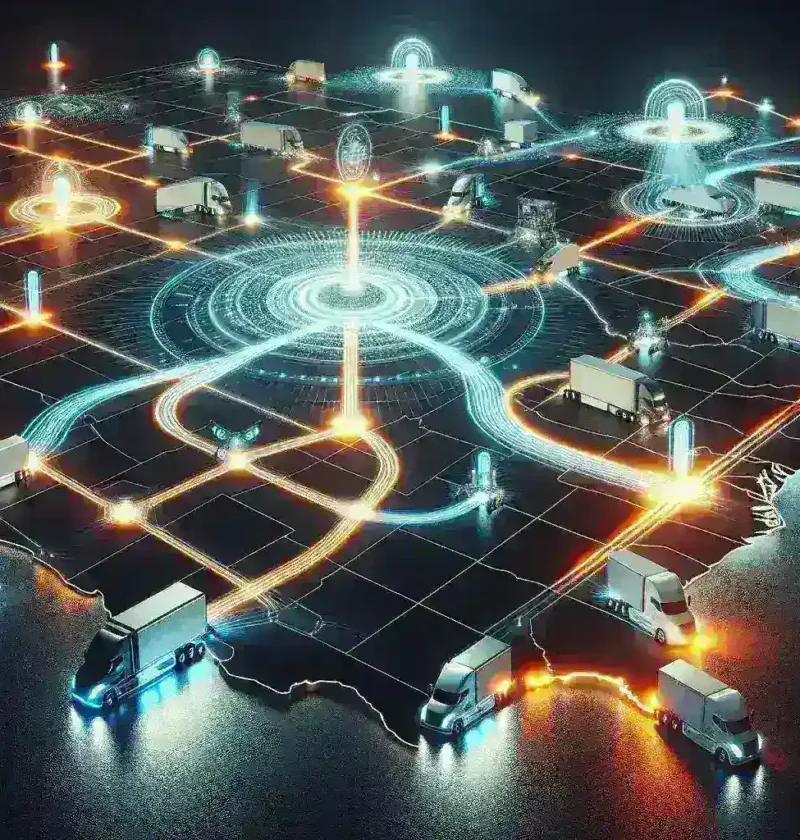Introduction
In the ever-evolving landscape of logistics, companies are continually seeking innovative solutions to enhance efficiency and reduce operational costs. One such company, Tesla, is making waves with its latest initiative: piloting AI-powered cross-state fleet coordination in U.S. logistics. This groundbreaking step not only promises to streamline the movement of goods but also sets the stage for a more sustainable future in transportation.
The Role of AI in Logistics
Artificial Intelligence (AI) has transformed various industries, and logistics is no exception. By leveraging advanced algorithms and machine learning capabilities, businesses can optimize routes, predict delivery times, and manage fleet operations with unprecedented precision.
Historical Context
The logistics industry has traditionally relied on manual processes and human decision-making, which often led to inefficiencies and increased costs. However, the integration of AI began gaining traction in the late 2010s, with significant advancements in data analytics and computing power. Companies that embraced AI found themselves at a competitive advantage, paving the way for Tesla’s innovative approach.
Tesla’s Vision for Fleet Coordination
Tesla’s foray into AI-powered fleet coordination is a part of its broader vision to revolutionize the transportation sector. The company aims to create a seamless, efficient network for moving goods across state lines, reducing delays and lowering emissions.
Key Features of Tesla’s AI-Powered System
- Real-Time Tracking: Tesla’s fleet will be equipped with advanced tracking technologies that provide real-time updates on vehicle locations and status.
- Route Optimization: Utilizing AI algorithms, Tesla will analyze traffic patterns and weather conditions to determine the most efficient routes.
- Predictive Maintenance: AI will monitor vehicle performance and predict maintenance needs, minimizing downtime and ensuring safety.
- Energy Management: The system will optimize energy consumption, utilizing Tesla’s electric vehicles to reduce carbon footprints.
Benefits of AI-Powered Fleet Coordination
The introduction of AI in fleet coordination offers several advantages that can transform logistics.
Increased Efficiency
AI can significantly reduce delivery times by optimizing routes and improving load management. This results in faster service for customers and a higher turnover rate for logistics companies.
Cost Reduction
By optimizing routes and reducing fuel consumption, companies can lower operational costs. Additionally, predictive maintenance can help avoid costly repairs and downtime.
Environmental Impact
The shift to electric vehicles, combined with AI-powered coordination, positions Tesla as a leader in sustainable logistics. By minimizing emissions through efficient routing and energy management, Tesla is addressing the environmental challenges faced by the logistics sector.
Challenges to Implementation
Despite the numerous benefits, implementing AI-powered fleet coordination is not without its challenges.
Data Privacy Concerns
As logistics companies collect vast amounts of data, concerns over privacy and data security arise. Ensuring compliance with regulations and safeguarding sensitive information is paramount.
Integration with Existing Systems
Many logistics companies still operate on legacy systems. Integrating AI technologies with these systems can be complex and costly.
Workforce Adaptation
The introduction of AI may require reskilling or upskilling current employees. Ensuring the workforce is equipped to manage and work alongside AI technologies is vital for success.
Future Predictions for AI in Logistics
Experts predict that AI will continue to reshape the logistics sector in the coming years. As companies like Tesla lead the charge, we can expect to see:
- Wider Adoption of Autonomous Vehicles: As technology advances, autonomous delivery vehicles may become commonplace.
- Enhanced Data Analytics: Companies will leverage big data analytics to make more informed decisions.
- Collaboration and Partnerships: Businesses will collaborate to share data and resources, enhancing overall supply chain efficiency.
Real Examples of AI in Action
Other companies are already reaping the benefits of AI in logistics. For instance, global logistics giants have implemented AI algorithms to optimize their supply chains, resulting in a notable decrease in operating costs and delivery times. Tesla’s initiative is set to build upon these successes.
Cultural Relevance
The significance of Tesla’s move extends beyond logistics; it reflects a broader cultural shift towards sustainability and innovation. In an era where consumers are increasingly conscious of environmental impact, businesses that adopt eco-friendly practices will likely gain customer loyalty and market share.
Expert Quotes
Industry leaders recognize the potential of AI in logistics. According to Dr. Jane Roberts, a logistics expert: “The integration of AI in logistics is not just a trend; it’s the future. Companies that fail to adapt will be left behind.”
Conclusion
Tesla’s initiative to pilot AI-powered cross-state fleet coordination in U.S. logistics represents a significant leap forward for the industry. By harnessing the power of AI, Tesla aims to streamline operations, reduce costs, and promote sustainability. As the logistics landscape continues to evolve, companies that embrace innovation will not only survive but thrive. The future of logistics is here, and Tesla is at the forefront of this transformative journey.

